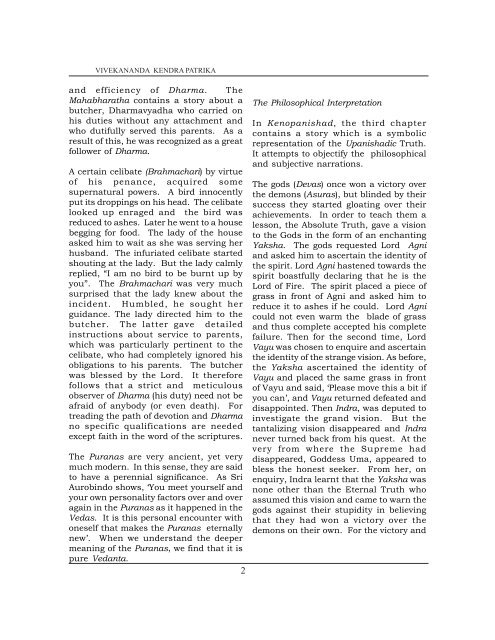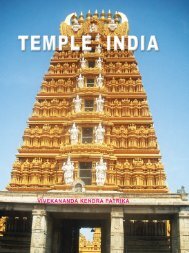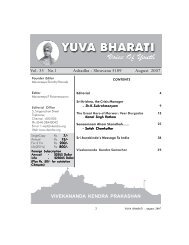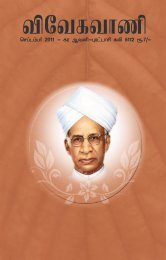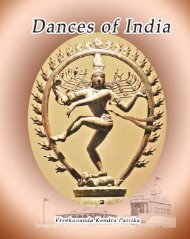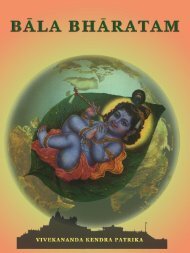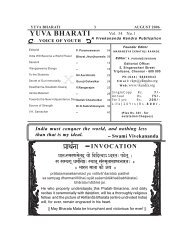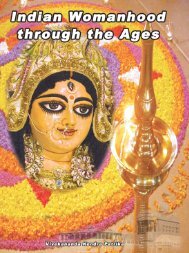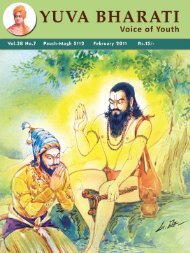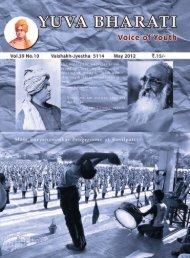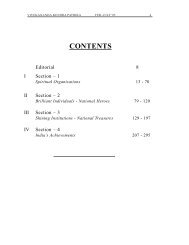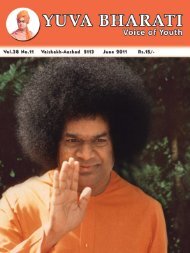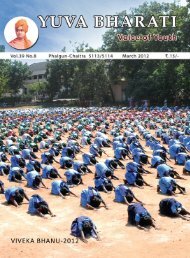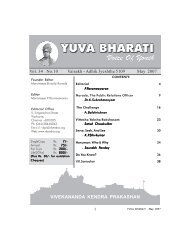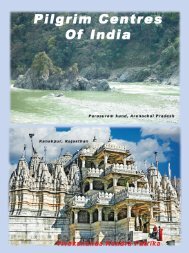Epics in Imprints-1.pdf - Vivekananda Kendra Prakashan
Epics in Imprints-1.pdf - Vivekananda Kendra Prakashan
Epics in Imprints-1.pdf - Vivekananda Kendra Prakashan
Create successful ePaper yourself
Turn your PDF publications into a flip-book with our unique Google optimized e-Paper software.
VIVEKANANDA KENDRA PATRIKA<br />
and efficiency of Dharma. The<br />
Mahabharatha conta<strong>in</strong>s a story about a<br />
butcher, Dharmavyadha who carried on<br />
his duties without any attachment and<br />
who dutifully served this parents. As a<br />
result of this, he was recognized as a great<br />
follower of Dharma.<br />
A certa<strong>in</strong> celibate (Brahmachari) by virtue<br />
of his penance, acquired some<br />
supernatural powers. A bird <strong>in</strong>nocently<br />
put its dropp<strong>in</strong>gs on his head. The celibate<br />
looked up enraged and the bird was<br />
reduced to ashes. Later he went to a house<br />
begg<strong>in</strong>g for food. The lady of the house<br />
asked him to wait as she was serv<strong>in</strong>g her<br />
husband. The <strong>in</strong>furiated celibate started<br />
shout<strong>in</strong>g at the lady. But the lady calmly<br />
replied, “I am no bird to be burnt up by<br />
you”. The Brahmachari was very much<br />
surprised that the lady knew about the<br />
<strong>in</strong>cident. Humbled, he sought her<br />
guidance. The lady directed him to the<br />
butcher. The latter gave detailed<br />
<strong>in</strong>structions about service to parents,<br />
which was particularly pert<strong>in</strong>ent to the<br />
celibate, who had completely ignored his<br />
obligations to his parents. The butcher<br />
was blessed by the Lord. It therefore<br />
follows that a strict and meticulous<br />
observer of Dharma (his duty) need not be<br />
afraid of anybody (or even death). For<br />
tread<strong>in</strong>g the path of devotion and Dharma<br />
no specific qualifications are needed<br />
except faith <strong>in</strong> the word of the scriptures.<br />
The Puranas are very ancient, yet very<br />
much modern. In this sense, they are said<br />
to have a perennial significance. As Sri<br />
Aurob<strong>in</strong>do shows, ‘You meet yourself and<br />
your own personality factors over and over<br />
aga<strong>in</strong> <strong>in</strong> the Puranas as it happened <strong>in</strong> the<br />
Vedas. It is this personal encounter with<br />
oneself that makes the Puranas eternally<br />
new’. When we understand the deeper<br />
mean<strong>in</strong>g of the Puranas, we f<strong>in</strong>d that it is<br />
pure Vedanta.<br />
2<br />
The Philosophical Interpretation<br />
In Kenopanishad, the third chapter<br />
conta<strong>in</strong>s a story which is a symbolic<br />
representation of the Upanishadic Truth.<br />
It attempts to objectify the philosophical<br />
and subjective narrations.<br />
The gods (Devas) once won a victory over<br />
the demons (Asuras), but bl<strong>in</strong>ded by their<br />
success they started gloat<strong>in</strong>g over their<br />
achievements. In order to teach them a<br />
lesson, the Absolute Truth, gave a vision<br />
to the Gods <strong>in</strong> the form of an enchant<strong>in</strong>g<br />
Yaksha. The gods requested Lord Agni<br />
and asked him to ascerta<strong>in</strong> the identity of<br />
the spirit. Lord Agni hastened towards the<br />
spirit boastfully declar<strong>in</strong>g that he is the<br />
Lord of Fire. The spirit placed a piece of<br />
grass <strong>in</strong> front of Agni and asked him to<br />
reduce it to ashes if he could. Lord Agni<br />
could not even warm the blade of grass<br />
and thus complete accepted his complete<br />
failure. Then for the second time, Lord<br />
Vayu was chosen to enquire and ascerta<strong>in</strong><br />
the identity of the strange vision. As before,<br />
the Yaksha ascerta<strong>in</strong>ed the identity of<br />
Vayu and placed the same grass <strong>in</strong> front<br />
of Vayu and said, ‘Please move this a bit if<br />
you can’, and Vayu returned defeated and<br />
disappo<strong>in</strong>ted. Then Indra, was deputed to<br />
<strong>in</strong>vestigate the grand vision. But the<br />
tantaliz<strong>in</strong>g vision disappeared and Indra<br />
never turned back from his quest. At the<br />
very from where the Supreme had<br />
disappeared, Goddess Uma, appeared to<br />
bless the honest seeker. From her, on<br />
enquiry, Indra learnt that the Yaksha was<br />
none other than the Eternal Truth who<br />
assumed this vision and came to warn the<br />
gods aga<strong>in</strong>st their stupidity <strong>in</strong> believ<strong>in</strong>g<br />
that they had won a victory over the<br />
demons on their own. For the victory and


